Speakers
 |
Erna Solberg, Prime Minister of NowayShe initiated the high level panel for a sustainable ocean economy. |
Hosts |
|
 |
Sissel Rogne, Director of Marine Institute Research, Norway |
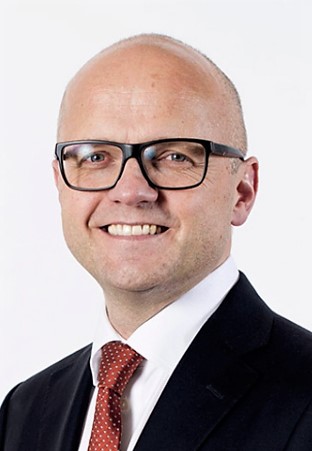 |
Vidar Helgesen, Special representative to the Prime minster’s High Level Panel for the Ocean, Norway |
Introductory speakers |
|
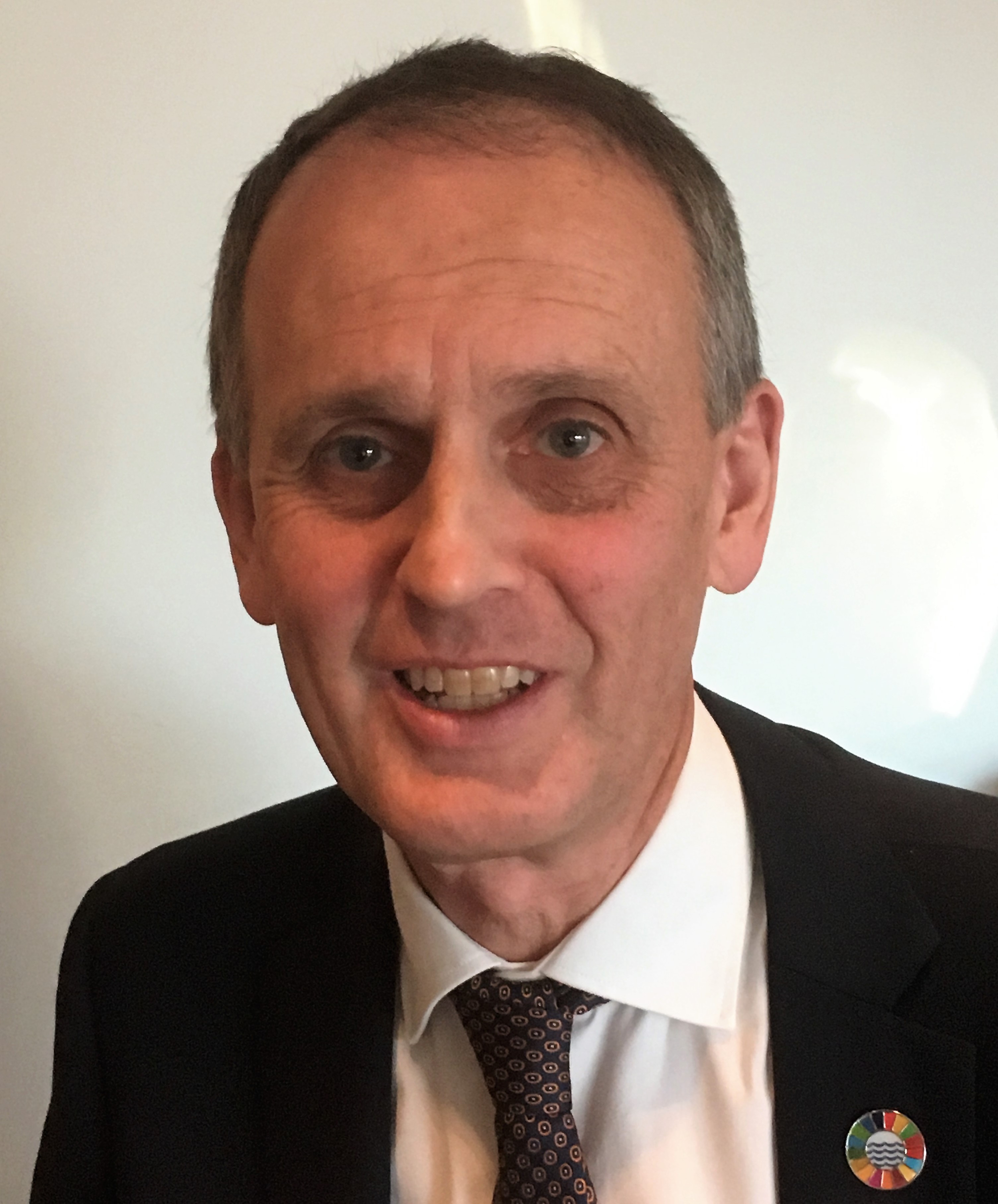 |
Peter Haugan, NorwayPeter Mosby Haugan is professor at Geophysical Institute, University of Bergen. His research has included various aspects of physical oceanography focusing on the North Sea and Arctic Ocean as wellas global ocean climate and carbon cycling. |
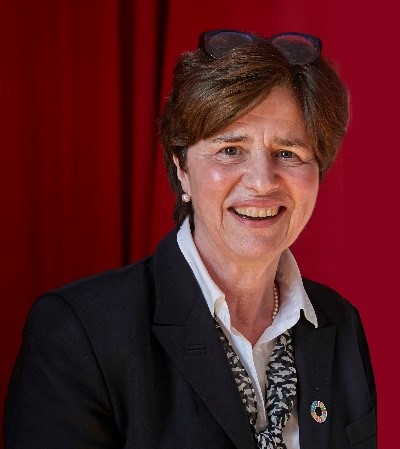 |
Kathrine Richardson, DenmarkKatherine Richardson is Professor of Biological Oceanography and Leader of the Sustainability Science Centre at the University of Copenhagen. She was Chair of the Danish Commission on Climate Change Policy which developed the plan for removing fossil fuels from the Danish energy and transport sectors upon which the current national energy strategy is based. She is a member of the Danish Council on Climate Change and a member of the United Nations Scientific Panel to draft the Global Sustainable Development Report, published in 2019. Her research is carried out in the Center for Macroecology, Evolution and Climate and focuses on biogeochemical processes in the surface ocean and how these are influenced by climate change. Specifically, her work deals with how changes in climate and biodiversity in the ocean interact to influence the global carbon cycle. She is also a co-leader in the development of the Planetary Boundaries framework aiming to identify a safe operating space for humanity in relation to its perturbation of the global environment. |
Speakers |
|
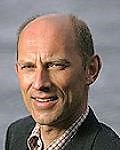 |
Dag Aksnes, NorwayDr. Dag L. Aksnes is a professor in marine ecology and former dean of the Faculty of Science and Mathematics at the University of Bergen. In recent years he participated as an expert in several scientific advisory processes regarding ocean use and protection, organised by the European Academies Science Advisory Council (EASAC) and the Science Advice for Policy by European Academies (SAPEA). In 2017 he led an expert group that addressed the question raised by the European Commission: “How can more food be obtained from the ocean without depriving the benefits of future generations.” |
Unexploited Fisheries ResourcesTo a first order, the amount of biomass that can be extracted sustainably from the ocean depend on the trophic level (TL) of the harvested organisms. Because traditional fisheries target high TL organisms, current landing is small (less than 100 MMT, million metric tons) compared to human food production (>7000 MMT). Two recent reports by SAPEA (Science Advice for Policy by European Academies) and EU-SAM (Scientific Advice Mechanism) conclude that the main potential for increased seafood production is extraction of food and feed at the lowest TLs. The global biomass of pelagic species such as krill (~TL2) and mesopelagic fishes (TL3 and higher, which is not particularly low) is large (>1000 MMT) and largely unexploited (landing <0.5 MMT), but also unexplored. It is uncertain to what extent such fishery can expand sustainably. There are concerns about negative effects on other ecosystem services, lack of knowledge concerning species abundances and biology in addition to lack of adequate capture technology. The EU-SAM Scientific Opinion recommends exploring granting of permits for scientifically-explorative pilot fishing well below the most conservative precautionary limits. Utilization of seaweeds (TL1) and filter feeders such as bivalves (~TL2) appear to have a much larger potential. The natural abundances of these benthic species are constrained by limited habitat. Wild capture is therefore small and considered environmentally unfriendly (bottom trawling). However, transfer of these organisms into the free water masses, provide a large global production potential. Feasibility is demonstrated by the expansion mollusc and aquatic plant productions from 3.6 to 16.1 MMT and 3.7 to 29.3 MMT respectively in the period 1990 – 2015, which corresponds to annual growth rates of ~6 and ~8%. Further expansion require allocation of areas, but unlike agriculture is independent of supply of fertilizers, feed, and freshwater. |
|
 |
Manuel Barange, FAOProfessor Manuel Barange has been the Director of the Fisheries and Aquaculture Policy and Resources Division at the FAO since 2016. Previously he was Deputy Chief Executive and Director of Science at the Plymouth Marine Laboratory, UK. He is an Honorary Professor at the College of Life and Environmental Sciences, University of Exeter, UK. In recent years he has focused his research and activities on the impacts of climate change on marine ecosystems and fisheries, and on the interactions between natural and socio-economic drivers of change. He has over 120 academic publications. In 2010 he was awarded the UNESCO-IOC Roger Revelle Medal for contribution to ocean science. |
Impacts of and adaptations to climate change in fisheries and aquaculture: not a zero-sum gameThe 2015 Paris Climate Agreement recognizes the need for effective and progressive responses to the urgent threat of climate change through mitigation and adaptation measures, while also considering the particular vulnerabilities of food production systems. Fisheries and Aquaculture are not only crucial producers of food for a growing population, but they are also critical sectors for millions of people struggling to maintain reasonable livelihoods from their use of natural resources. With this in mind this presentation will provide a synthetic view of the disaggregated impacts of climate change for marine and inland fisheries in the context of poverty alleviation and the differential dependency of countries on fish and fishery resources. The presentation will rely on model projections as well as regional expert assessments. Evidence indicates that climate change will lead to production and distributional changes throughout ocean regions, potentially resulting in conflicts between users, both within and between countries. To avoid a zero-sum game, let alone a negative-sum game will require effective and targeted adaptations capable of minimizing the threats and maximizing the opportunities emerging from climate change. Furthermore, we conclude that the sustainability of the fisheries and aquaculture sectors will be determined by their ability to adapt, in a way that takes into account the multifaceted context of fisheries, with any additional measures complementing overall governance for sustainable use. With this in mind we will provide guidance on the tools and methods available to facilitate and strengthen adaptation measures within three primary adaptation entries: institutional and management, those addressing livelihoods and, thirdly, measures intended to manage and mitigate risks and thereby strengthen resilience. We conclude by reflecting that just like effective management, effective adaptation can be positive and empowering. However, lack of adequate long-term planning could increase inefficiencies and maladaptation, exacerbating rather than reducing impacts. |
|
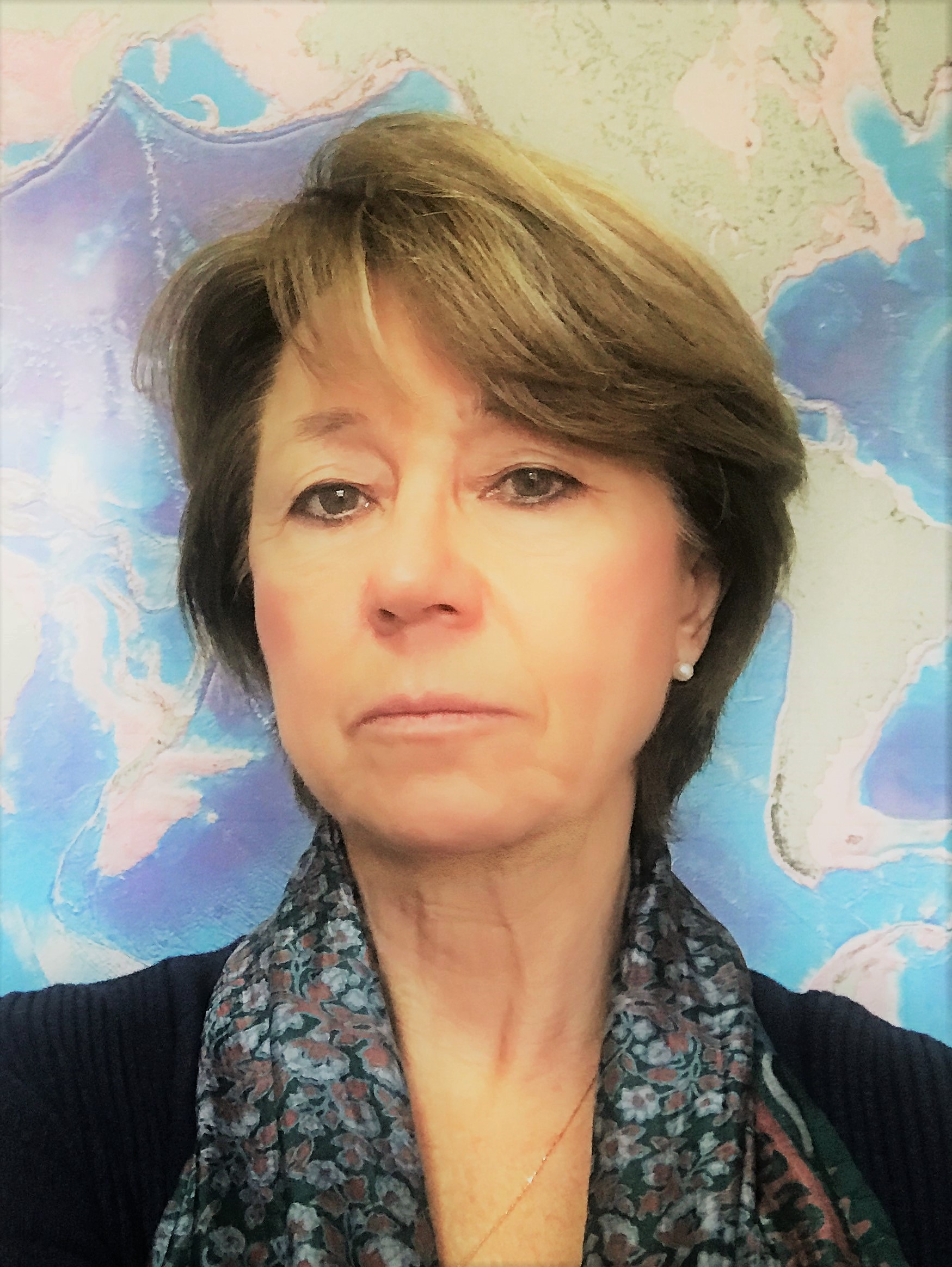 |
Gabriella Bianchi, NorwayDr. Gabriella Bianchi has extensive experience with ocean sustainability issues, particularly in a development context. Her field of work ranges from marine biodiversity, marine ecology, to fisheries/environmental management and capacity development. In addition to working at the Institute of Marine Research in Bergen, where she leads the “Centre for Development Cooperation in Fisheries”, she has served at the UN FAO for many years, focusing on developing and promoting the Ecosystem Approach to Fisheries. She is currently coordinating the research activities linked to the FAO EAF-Nansen Programme, including the RV Dr. Fridtjof Nansen. |
Future sustainability of fisheriesThe future of fisheries relies on its ability to respond and adapt to the multiple pressures that come from within and outside the sector. As the last food-producing sector based on harvesting from the wild, and therefore fully dependent on the sustainable issue of aquatic ecosystems as compared to other sectors, the fisheries sector has long identified its weaknesses and developed a full suite of instruments, tools and approaches to promote and implement sustainable practices. Implementation of these lags behind and ways to incentivise putting them into practice need to be identified and strengthened. As regards knowledge needs, stronger emphasis has to be placed on adoption of risk-based decision-making for data-poor situations, in support of “primary” form of management. However, today the major threats to sustainability of fisheries come perhaps from outside the sector, i.e. increasing pressure on natural systems because of population growth and related direct and indirect impacts, improved standard of living allowing more to access valuable, alternative use of aquatic ecosystems and climate change. In this situation, greater attention to governance systems that harmonize principles and norms and integrate decision-making across sectors is needed, together with an enabling environment globally that encompasses a shared value system. |
|
 |
Anne Christine Brusendorff, DenmarkDr. Anne Christine Brusendorff has been the leader of the ICES Secretariat in Copenhagen, since 2012. During her term, she has promoted integrated ecosystem understanding with the aim of developing integrated ecosystem assessments in regional seas, and the application of ICES knowledge for the UN Ocean agenda. She holds a PhD in International Law of the Sea and International Environmental Law.
|
Future sustainable use of ocean biological resourcesSocietal expectations that the marine environment will meet future needs have never been so high; but neither has the range and intensity of human pressures affecting them been so great. This is also reflected in the number of policies addressing ocean governance. |
|
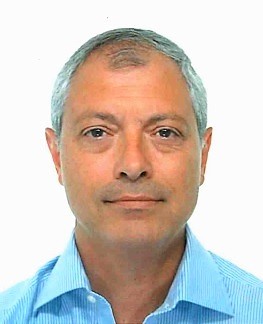 |
Matthew Camilleri, FAODr Matthew Camilleri holds a degree in Fisheries Science and Ocean Science, and a PhD in fisheries management from the University of Plymouth, UK. He served as fisheries consultant to the Maltese Government and Head of the Malta Centre for Fisheries Sciences from 1998 to early 2007. He moved to Rome, Italy in 2007 to work for the Food and Agriculture Organization of the United Nations (FAO) and is currently the Head of the Fishing Operations and Technology Branch within the Organization. He leads FAO’s global capacity development programme to support countries in combatting illegal, unreported and unregulated fishing. |
Illegal, Unreported and Unregulated fishingThe principles of responsible fisheries management have been prescribed in a number of international ocean and fisheries instruments, and have been supported and strengthened by Regional Fisheries Management Organizations (RFMOs) around the globe. However, States do not always satisfactorily fulfill their duties in line with such instruments and regional mechanisms, giving space for Illegal, Unreported and Unregulated (IUU) fishing to occur. IUU fishing is recognized as a major threat not only to the sustainability of fisheries resources per se, but also to the livelihoods of legitimate fishers, food security and nutrition, especially in countries which are highly dependent on fish products, as well as to the conservation of marine ecosystems. |
|
 |
Peter Cranford, CanadaDr. Peter Cranford is an oceanographer/marine ecologist employed by the Canadian government in the Department of Fisheries and Oceans. His national and international research activities have promoted the use of an integrated multidisciplinary team approach to understanding the complexities of marine ecosystem interactions with bivalve and finfish aquaculture. This research has focused on the provision of advice on effective regulatory measures for ensuring aquaculture sustainability. He is a contributing editor of the journal of Aquaculture Environment Interactions and recently moved to the St. Andrews Biological Station where he is developing long-term research under a new national program on Aquaculture Ecosystem Interactions. |
Global aquaculture challengesGlobal aquaculture production has grown rapidly and currently rivals that of capture fisheries for human consumption. A large fraction of this production comes from the ocean’s coasts and estuaries; primarily those in China. Aquaculture growth has been considerably slower in most other coastal nations despite projections of suitable space. Reasons for this relatively slow rate of development are linked to a diverse array of environmental, social, economic and technical challenges that individually and collectively influence current aquaculture activities. Key aquaculture challenges within each category will be reviewed towards the development of recommended action points aimed at addressing sustainability, regulatory, technological, public resistance, and knowledge gap hurdles that slow industry expansion. |
|
 |
Carlos M. Duarte,Prof. Carlos Duarte is Research Chair in Red Sea Ecology at King Abdullah University of Science and Technology (KAUST) in Saudi Arabia. He has conducted research on marine ecology, from microbes to large marine animals, across all habitats and oceans, focusing on the role of marine biota in biogeochemical cycles and the functioning of marine ecosystems, and their responses to human pressures. He has published more than 700 scientific papers, and served as President of the American Society of Limnology and Oceanography from 2007 to 2010. His current research focusses on how the ocean can deliver solutions for humanity’s grand challenges. |
Opportunities for marine aquacultureWhereas humans dominated controlled food production on land 10,000 yrs. ago, large-scale aquaculture is a new industry, with only four decades, but growing at about 7% annually. Further development of marine aquaculture is an imperative to meet the challenge of feeding 9 billion people by year 2050. However, aquaculture must transition to a sustainable industry, which requires a focus on closing the production cycle and focusing on macroalgae and low trophic-level products. Moreover, aquaculture has the potential to become a technology to improve ocean health, through removing excess nutrients, improving oxygen conditions, attenuating ocean acidification locally, helping rebuild populations of wild marine animals, and helping mitigate climate change. Succeeding in this transition requires that the aquaculture industry, often involving low-income entrepreneurs and farmers, be subsidized for the environmental benefits they deliver, so the business model deviates from relying on producing, non-sustainable, high-value fish. To do so, aquaculture must also transition directly from the 2nd, industrial revolution, as it is a largely low-tech industry, directly into the 4th industrial revolution. This requires a closer coupling between production and research, delivering innovation, as well as a regulatory space more aware of the needs and importance of aquaculture and its potential to be a positive force in improving ocean health. |
|
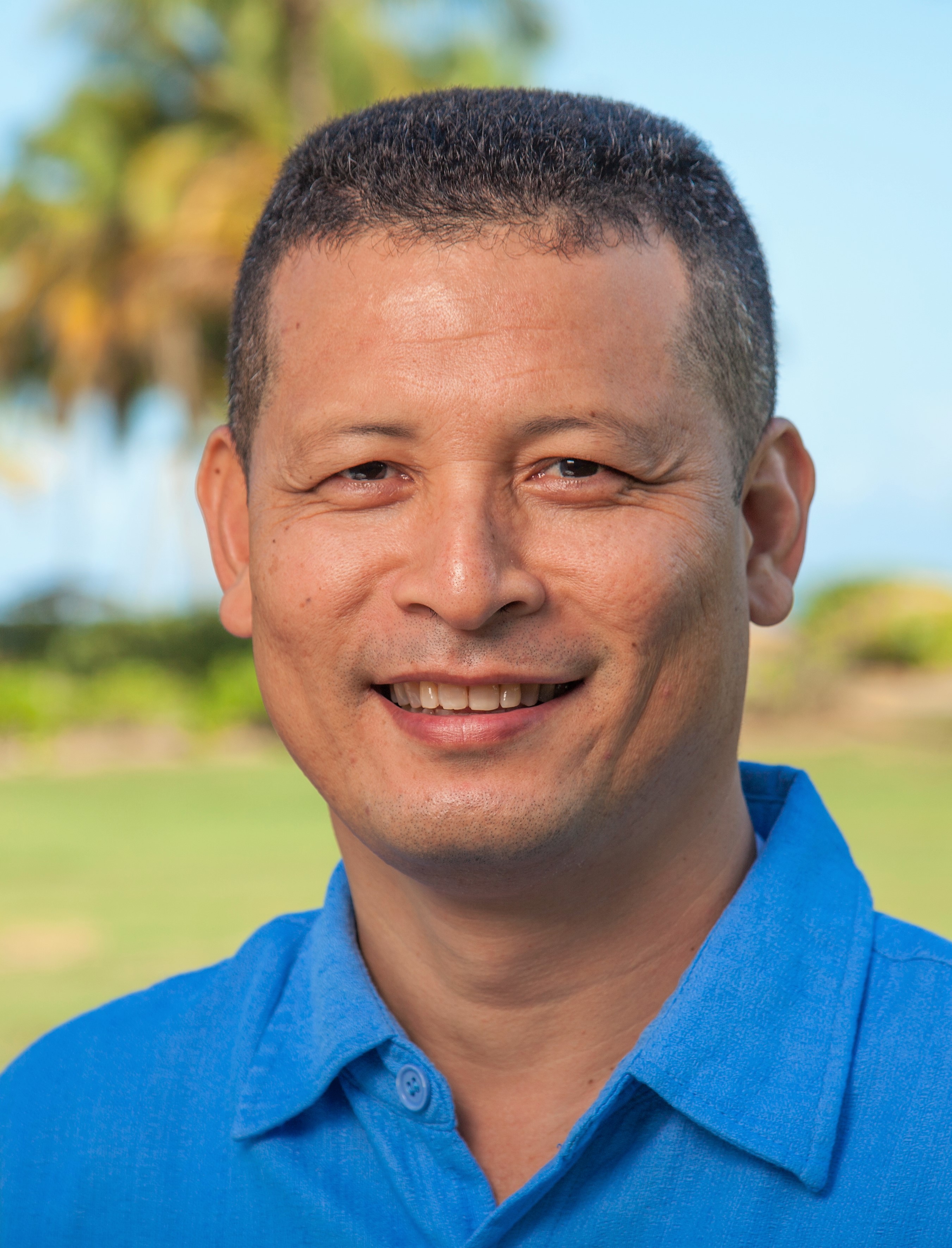 |
Yimnang Golbuu, PalauDr. Yimnang Golbuu is the CEO at the Palau International Coral Reef Center. His research interests include Marine Protected Areas (MPAs), relationship between land use change and coral reefs, and impacts of climate change on coral reefs of Palau. Presently, he is a Member of the Northern Reef Co-Management Committee, the Palau National Commission of UNESCO, Palau National Marine Sanctuary Executive Committee, Vice President of the International Society for Reef Studies and Palau’s Point of Contact (POC) for the US Coral Reef Task Force. |
Climate change and coral reefsCoral reefs provide important resources and ecosystem services that people living near the coast have depended on for generations, in particular, islanders. Yet, coral reefs are highly threatened by the impacts of climate change. The increasing in water temperature leads to coral bleaching, a process where corals lose their symbiotic algae, leaving behind only the white coral structure, which is referred to as coral bleaching. Because corals rely on their symbiotic algae to provide most of their nutrition, most of the corals will die of starvation when they lose these algae. The lowering of pH of the ocean, referred to as ocean acidification, can also affect the ability of corals and other calcifying organisms to grow and develop. Experimental work and field studies have shown that corals lose diversity and abundance when the pH of the water is lowered. Extreme weather events such as typhoons and hurricanes can devastate reef by the force of the waves and winds. These challenges facing reefs will continue to worsen as the amount of carbon dioxide continues to increase in the atmosphere. However, research and field studies at some places, including Palau, have shown that some corals and coral reef communities have been found to be more tolerant to these two climate change impacts. These findings give us hope that while we continue our global efforts to reduce the carbon dioxide concentration in the atmosphere via reducing our emissions and increasing carbon sequestration, we should not forget that big impacts can also happen at the local level. |
|
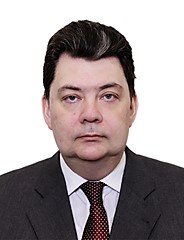 |
Dmitry Gonchar, USADmitry Gonchar is a Legal Officer at the UN Division for Oceans and the Law of the Sea (DOALOS). He has served in different positions in the Legal Department of the Russian Foreign Ministry and Russian Permanent Missions to the International Organizations in Vienna and Geneva. He has dealt with issues relating to the Law of the Sea, fisheries, polar regions, environmental law, outer space law. He has participated in several international meetings and conferences, including UN General Assembly Oceans Processes and Regional Fisheries Management Organizations/Arrangements, and has been involved in drafting several international agreements. |
Ocean Governance, the science-policy interface and the role of United Nations oceans-related processesThe United Nations Convention on the Law of the Sea is the cornerstone of the international law of the sea and therefore forms the basis for ocean governance.
|
|
 |
Tamara Galloway, UKTamara Galloway is Professor of Ecotoxicology at the University of Exeter and also holds an Honorary Chair at the University of Exeter Medical School. Her research focus is in understanding how organisms adapt and survive in polluted environments and she studies the health effects of some of the most pressing priority and emerging pollutants: including complex organics, plastic additives, micro- and nano-particles. She is an expert member of several international and national committees charged with environmental protection and the promotion of translational research, She is listed by Clarivate in 2017 as one of the world’s most highly cited researchers. |
Plastic and microplastic pollutionContamination of the aquatic environment with marine litter, and in particular with plastic debris is a conservation issue of high concern. Once plastic debris reaches the oceans, it fragments into micro- and nano-plastics and it has been estimated that up to 80% of all the plastic in the sea is in the form of nanoplastics. Many potential interactions exist between plastics and other marine contaminants, including persistent organic pollutants, metals and bacteria (including pathogens). This presentation will provide a brief overview of our current understanding of the impacts of these complex pollutants on marine ecosystems, and their potential interactions with critical biological and biogeochemical processes. Knowledge gaps will be identified, with a focus on the likely entry points of plastics and associated chemicals into the marine food chain. Potential areas for breakthrough will be identified and regional versus global actions points reviewed. |
|
 |
Bjørn Einar Grøsvik, NorwayBjørn Einar Grøsvik is an ecotoxicologist. The focus of his research is surveillance and mapping of pollutants in Norwegian waters and coastal areas in order to understand how pollution affects the marine ecosystem and environmental status. This includes the effects of plastics and microplastics on the marine environment. Bjørn Einar is also involved in providing research-based advice to the government. |
 |
Gro-Ingunn Hemre, NorwayDr. Gro-Ingunn Hemre is Director of Research at the Institute of Marine Research (IMR) in Bergen, Norway, and is responsible for IMR's activities relating to fish nutrition, and safe and healthy seafood. She trained as a fish nutritionist, and was leader of the Aquaculture Nutrition research group for a decade, prior to becoming Director of Research for the Fish Nutrition program at the National Institute of Nutrition and Seafood Research (NIFES) (now merged with IMR). Her focus was on the methodology used to survey and support up-to-date research on fish nutrition and safe and healthy seafood. Gro-Ingunn has been a member of the Norwegian Scientific Committee for Food and Environment (VKM) since it started in 2004, and is now second in command of the steering committee responsible for food safety issues. She served on the High Level Panel of Experts for World Food Security (CFS), and contributed to the preparation of its report on sustainable fisheries and aquaculture for food security and nutrition. She will represent CFS in this meeting. |
Seafood in relation to health and developmentThe UN organization, Committee of World Food Security focus how to secure that all people at all times have sufficient, safe and nutritious food that fulfills their dietary needs. In 2014 CFS published the report on the role of fisheries and aquaculture, and how aquatic food can be a part to fulfill SDG2 and SDG14. The statistics show aquatic food only supports 2% of our energy intake and 16% of animal protein intake, although more than half of the biomass production on earth comes from the ocean. To eradicate hunger before 2030, which is the aim of SDG2, is a huge challenge, which will need more aquatic food if we are going to succeed. The world population lack high quality protein, which is abundant in aquatic food. The world also lack essential micronutrients, this results in malnutrition and diseases, especially in low income countries. Aquatic food is very rich in most of the micronutrients lacking in plants, and land-based meat. Therefore CFS agrees with WHO, EFSA and FDA that fish should be a natural part of a healthy diet, especially for young women, and children, to secure their development. They all agree that countries must “emphasize the neurodevelopmental benefits to offspring of fish consumption by women of childbearing age, particularly pregnant women and nursing mothers, and the neurodevelopmental risks of not consuming fish to offspring of such women” |
|
|
|
Simon Jennings, UKDr. Simon Jennings is marine scientist. Through international collaboration he seeks to shape scientific understanding of marine ecosystems and their interactions with people and the environment — and to create stronger links between fundamental, applied and translational research to advance monitoring, assessment and management. Simon currently chairs the ICES Science Committee with responsibility for increasing the scope, scale and impact of ICES science. |
Generating evidence and advice to sustain seafood suppliesTo meet the long-term needs of society, we aim for seafood production that is sufficient, sustainable, safe, shock-proof and sound. This means that seafood production should be sufficient to feed people and provide livelihoods and choice; safe, to give nutritional benefits while posing minimal risk to health; sustainable, to be available now and for future generations; shock-proof, to changes in production systems and supply chains; and sound, to meet legal standards and ethical expectations for welfare of fish, fishers and the environment. But there are many trade-offs, both within and between these aims. Science, by providing understanding of the natural and social world following systematic methods based on evidence, can provide the knowledge needed to characterise and to try to reconcile these trade-offs, identify feasible pathways and options for development and to separate hearsay or beliefs from differing but accurate interpretations of the same evidence. But the impact of science on decision making, and hence the extent to which it helps achieve societal goals, depends on how it is conducted as well as what is done. The creation of science that is credible and legitimate as well as salient, and effectively underpins impartial advice, requires international collaboration and collective innovation. In relation to ‘how’, this talk highlights the benefits of harnessing regional expertise to co-create balanced and evidence-based expositions of the status and potential of the aquatic food system and the ecosystems that support it. In relation to ‘what’ the talk addresses understanding and operationalisation of ecosystem-based fishery management and maximum sustainable yield concepts, as well as science priorities related to seafood production and the need to better recognise and address connectivity, trade-offs, opportunities and risks for food systems spanning land and sea and creating interactions between regions, nations and continents. |
|
 |
Anna Lartey, FAOProfessor Anna Lartey is the Director of Nutrition and Food Systems Division at the Food and Agriculture Organization of the United Nations, Rome, Italy. Anna was Professor of Nutrition at the University of Ghana for 27 years. She was a Fulbright fellow (1994-1998) at the University of California, Davis, USA. Anna won the University of Ghana’s “Best Researcher Award for 2004”. She is the recipient of the Sight and Life Nutrition Leadership Award for 2014. She was the President of the International Union of Nutritional Sciences (IUNS, 2013-2017). Anna was awarded a Doctor of Science honoris causa, by McGill University (June 2018). |
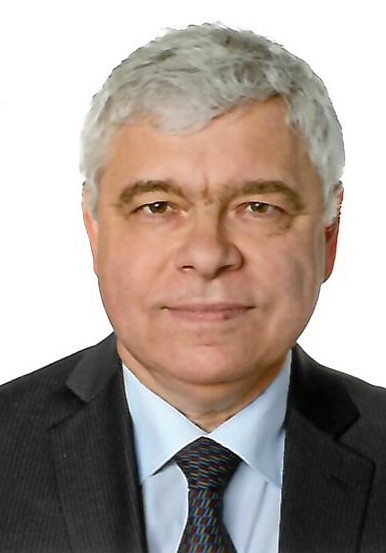 |
Vladimir Ryabinin, IOC UNESCODr Vladimir Ryabinin is Executive Secretary of the Intergovernmental Oceanographic Commission of UNESCO and Assistant Director-General of UNESCO. Previously, he was a researcher and Head of Laboratory at the Hydrometcentre of Russia, lecturer at the Moscow State University, Executive Director of the International Ocean Institute, and Senior Officer of the World Climate Research Programme at the World Meteorological Organization in Geneva, Switzerland. His research foci include oceanography, fluid dynamics, weather and marine prediction, numerical mathematics, polar research, shelf engineering, and wind wave modelling. He has beeen affiliated with several initiatives or campaigns including Global Ocean Observing System, International Polar Year, the UN Decade of Ocean Science for Sustainable Development (2021-2030), etc. |
The future of ocean science, stepping up from curiosity to societal serviceOcean, the largest ecosystem on our planet and a Common Heritage of Humanity, provides to our civilization a range of existentially-important services. To keep benefitting from them, an equilibrium must be reached between the continuously increasing use of ocean space and resources and restoring and maintaining ocean’s health, which is currently in fast decline. Actions to achieve such a balance are all science-intensive. The pivotal role of Intergovernmental Oceanographic Commission (IOC) of UNESCO is therefore to bring together the scientific communities and the governmental decision making system in creating an efficient science-based integrated ocean management. This requires targeting ocean research on solutions for sustainable development. |
|
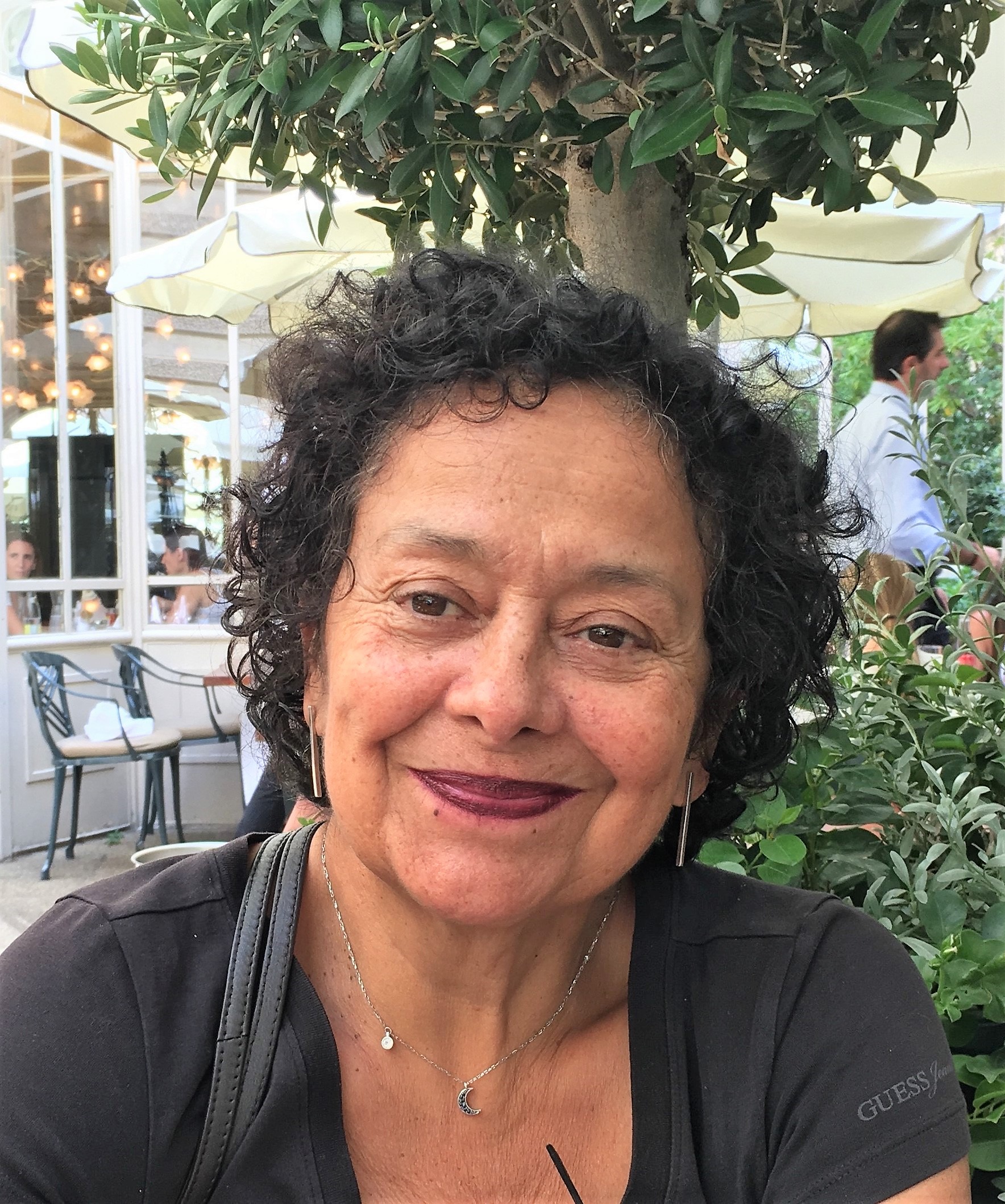 |
Doris Soto, ChileDr. Doris Soto worked as a professor at Universidad Austral de Chile in Puerto Montt between 1990 and 2004 where she developed the Aquatic Ecology Research Unit addressing the environmental implications of aquaculture and the interactions between aquaculture and fisheries. From 2005 Dr. Soto worked at the UN FAO headquarters in Rome as a Senior Aquaculture Officer and led numerous field projects and initiatives in different countries in Asia, Africa, Latin America and Europe. While at FAO she also led the development and pilot implementation of guidelines for the implementation of an ecosystem approach to aquaculture and also efforts to address the implications of climate change for the sector. In 2016, Doris returned to Chile to continue her research and training at the Interdisciplinary Center for the Sustainable Development of Aquaculture (INCAR). She leads the area of climate change adaptation and the development and implementation of the ecosystem approach to aquaculture, in collaboration with the salmon and mussel farming industries. |
The ecosystem approach to aquaculture: science and management needsToo often aquaculture planning and management has focused on production within a very short time scale and in most cases it has grown with limited or no considerations to the negative added, cumulative and synergistic impacts of numerous farming systems (small and large) within one ecosystem. This is a special challenge if we plan to increase mariculture contribution to food security and development. Most regulations for mariculture today focus on the monitoring and control of individual farms while the broader interactions within the ecosystem are rarely addressed. This is also the case of certification systems that focus on the performance of individual farms. |
|
 |
Peter Swarzenski, MonacoDr. Peter Swarzenski is a chemical oceanographer and is Section Head of the IAEA Radioecology Laboratory (REL) in Monaco. He oversees support provided to Member States to research diverse marine stressors, including deoxygenation, ocean acidification, contamination, harmful algal blooms, and marine plastics. |
Ocean HealthThe world’s oceans have long been perceived to contain an endless bounty and capacity to absorb all human impacts. However, heightened pressures on marine environments over the last decades caused from human population increases and migrations towards lucrative coastal areas, and expansion of broad industrial and agricultural practices have led to the realization that the ocean's health is compromised and under threat. Today, climate change, pollution, habitat alteration, and overfishing are considered primary threats to ocean health. Observations suggest that the world’ oceans may be on the verge of a major change that can trigger irreparable damage to marine life and ecosystems. New tools to study ocean health are being developed, yet the ability to accurately assess the well-being of the ocean remains challenging, simply due to the ocean’s vastness and inherent complexities. |
|
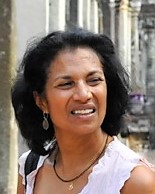 |
Shakuntala Haraksingh Thilsted, MalaysiaDr. Shakuntala Haraksingh Thilsted is Leader of the Value Chains and Nutrition Research Program at WorldFish. Her work focusses on nutrition-sensitive fish agri-food systems, in particular increased consumption and production of fish in combating and preventing micronutrient deficiencies in low- and middle-income countries. She works with fish-based products for women and children in their first 1000 days of life, to improve women’s nutrition and health, and growth, development and cognition in children. She plays a pivotal role in promoting the agenda of fish for nourishing nations as well as the importance of the fisheries sector in contributing to achieving the Sustainable Development Goals. |
Dietary needs - Fish give big gains in nourishing nationsThe Sustainable Development Goals (SDGs) make achieving food and nutrition security and ending malnutrition a global priority. The benefits of fish for optimal nutrition are increasingly being recognized, with many high-income countries having national dietary recommendations for increasing fish intake, with some consideration to women and children in the first 1,000 days of life. Fish intake is associated with reduced risk of mortality due to heart disease, whereas, low fish intake during pregnancy increases the risk of suboptimal neurodevelopmental outcomes, including cognition and fine motor skills in the child. Fish intake is also associated with reduced stunting in young children. The high levels of multiple nutrients in fish: minerals, vitamins, essential fatty acids and animal protein - many of which are not found in plant-source foods - and the much higher bioavailability of the nutrients found in fish in comparison to those found in plant-source foods, underpin the value of fish for nourishing people. For example, fish is a rich source of vitamin B12, found only in animal-source foods, which is essential for multiple functions: growth, brain function and nervous system maintenance. Dried small fish powder provides a dense source of multiple, essential nutrients for young children who eat small quantities. In addition, fish enhances the uptake of micronutrients from plant-source foods in the meal. Nutrient composition of fish species varies widely, typically with small-sized species from capture fisheries having much greater concentrations of micronutrients than large-sized species from aquaculture. Greater knowledge and understanding of the irreplaceable role of common fish species and fish products in nourishing people, especially the poor in low- and middle-income countries must reach decision makers. A food systems approach, with investments in nutrition-sensitive policies and interventions in both capture fisheries and aquaculture is essential to ensure the full potential of the fisheries sector towards nourishing nations between now and 2030. |
|
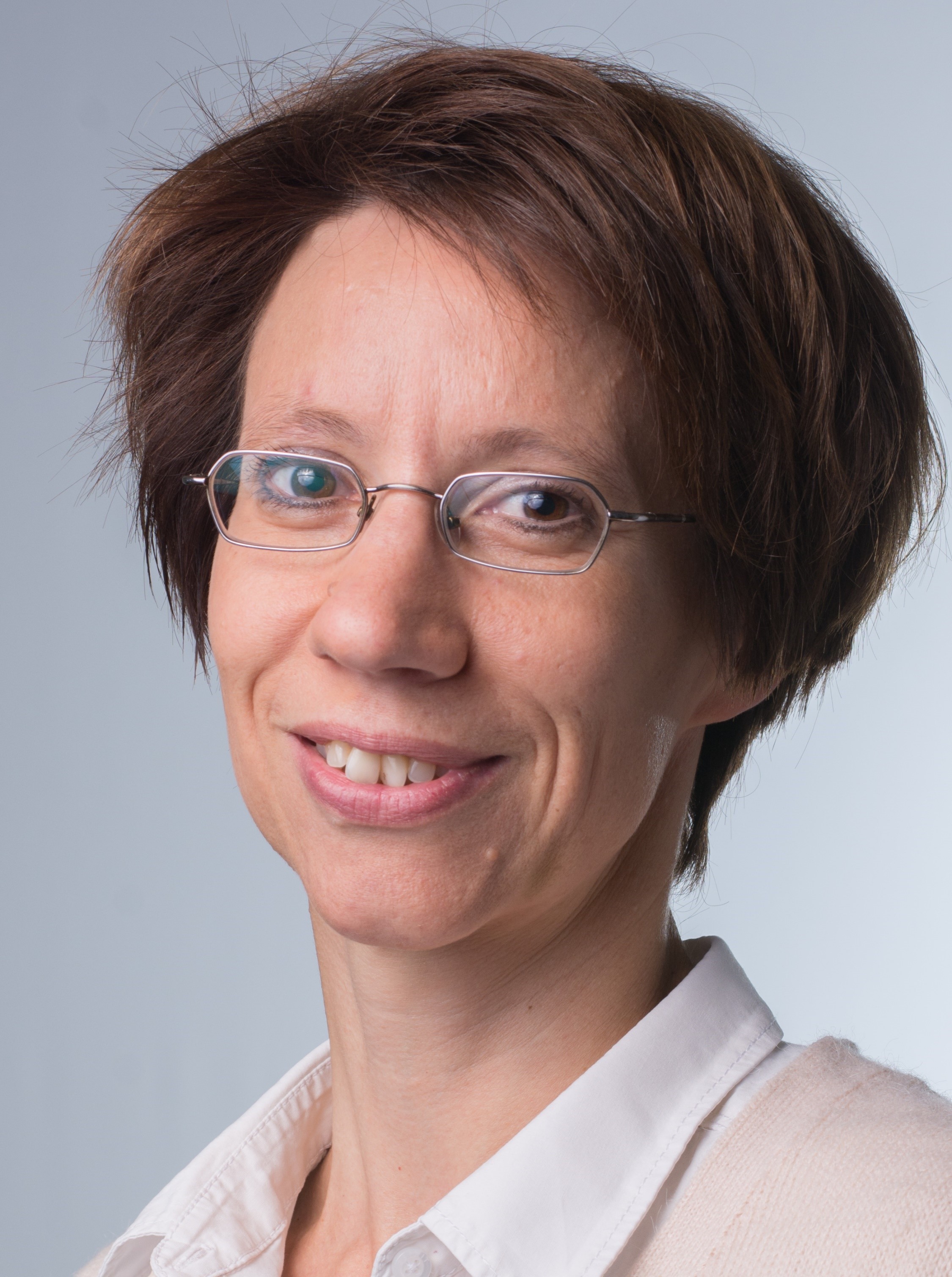 |
Katrin Vorkamp, DenmarkDr. Katrin Vorkamp worked as a postdoctoral researcher at Aalborg University in Denmark and then accepted a scientist position at the National Environmental Research Institute. In 2007, the institute merged with Aarhus University. Katrin works with organic contaminants in the environment, with a focus on persistent organic pollutants (POPs) and emerging contaminants. Her research includes Arctic pollution, contaminants and microplastics in the marine environment and human exposure to contaminants. |
 |
John Warner, USADr. John Warner is one of the founders of the field of Green Chemistry. He received the 2004 Presidential Award for Excellence in Science Mentoring (one of the highest awards for US science education), the 2014 Perkin Medal (one of the highest honors in American Industrial Chemistry) and was named a 2016 AAAS-Lemelson Invention Ambassador. His inventions and over 150 patents in molecular design, pharmaceuticals, cosmetics, adhesives, metals recycling, asphalt pavement and solar energy are the basis for several startup companies and provide the backdrop to his theories on creativity and innovation in the service of a sustainable and toxin-free global environment. |
Repairing and Protecting the Oceans with Green ChemistryThe natural world is a beautiful and intricate system of intertwined and overlapping materials ecosystems. As humans, our understanding of the various interrelationships is only at the most basic level. One important reason why these naturally interdependent cyclic systems exist with exquisite complexity is because of the very fact that they all co-emerged over hundreds of thousands of years in the presence of one another. Evolutionary forces drove symbiotic relationships by selecting for and against mechanisms and materials that were conducive to the success of the entire multi-component matrix. As human society seeks to create a circular economy, we unfortunately have the disadvantage that our various industrial “species” have developed with a level of independence, essentially unaware of adjacent processes. We are forced into a position of creating connectivities that were not part of the considerations in the original design. Obviously this creates a daunting challenge. While there have been some examples of the circular economy designed and deployed in many industrial settings, the vast majority of industrial products and processes continue to exist disconnected and unsustainable over the long run. The pathway to create most of these technological ecosystems will require the inventive application of green chemistry (the molecular level mechanistic underpinnings of sustainability). Organizations can develop circular strategic benefit from integrating the principles of green chemistry with product design, manufacturing and supply chain management. |
|
 |
Cisco Werner, USAFrancisco "Cisco" Werner is Chief Science Advisor of NOAA’s National Marine Fisheries Service. Cisco’s research has focused on the development and implementation of circulation models in the Atlantic and Pacific Oceans. He has studied the effects of physical forcing on the structure and function of marine ecosystems, and impacts on commercially and ecologically important species. Prior to his current position, he was the Director of NOAA’s Southwest Fisheries Science Center, and Director and Professor of Rutgers University’s Institute of Marine and Coastal Sciences. Cisco received his BSc in Mathematics and PhD in Oceanography, both from the University of Washington. |
Ecosystem Approaches – Sustainable Ocean UseThe purpose of our oceans continues to evolve and challenge our scientific ability to manage them for sustainable use. The traditional purposes of transportation and extraction continue to expand and broaden in their scope to cover such issues as the creation of livelihoods in developing countries, nutrition, food security, aquaculture, and deep-seabed mining, to name a few. Population growth, development and land-use conversion are the main drivers that put ever increasing pressure on using the oceans to address societal needs. Each of the topic areas covered at the conference demonstrate the impacts of these changes, but the topics also interact with each other. Through multi-disciplinary Integrated Ecosystem Assessments, or similar frameworks, we have improved our ability to develop likely future ecosystem scenarios and conduct trade-off analyses that look at environmental, economic and social impacts of different management actions. In order to keep up with the changing demand on our oceans, this capability will require a continuing investment in the scientific disciplines and related data collection and monitoring; but also in the development of “knowledge brokers” who can work at the science-policy interface to guide the development of research products and their interpretation and use in management. The best scientific products, however, will be ineffective if the appropriate management institutions do not exist to take advantage of this science advice that crosses ocean use sectors. |
|

